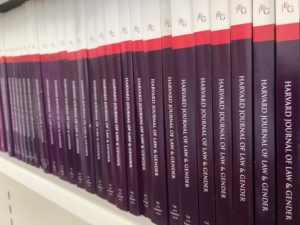About Our Journal
Get Involved
Latest Print Edition
Past Volumes
About the Harvard Journal of Law and Gender
Founded in 1977 and currently on the 47th volume, the Harvard Journal of Law and Gender (originally the Harvard Women’s Law Journal) is the nation’s oldest continuously publishing feminist law journal. JLG is an intersectional feminist publication, devoted to the advancement of feminist jurisprudence and the study of law and gender. We seek to clarify legal issues that have gendered aspects and implications, confront new challenges to full social equality, and explore the interconnections between race, class, sexuality, nationality, ability, and gender in the law.
Are you an HLS student? Contact us at hlsjlg@gmail.com to be added to our email listserv!
Online Content
Strategic Communications for Promoting School Sex Education Reform in Massachusetts to Combat Gender-Based Violence and Toxic Masculinity
By Harry Chiu **** H.673/S.318, “An Act Relative to Healthy Youth,” is a proposed Massachusetts bill that aims to reform sex education in K-12 schools. Based on current research in gender-based violence prevention in schools, this bill would be an impactful and positive step toward reducing gender-based violence in schools and promoting healthier gender identities […]

FAILING TO RECOGNIZE OBJECTIFICATION AND SEXUALIZATION OF WOMEN AS SYSTEMIC DISCRIMINATION: WORKPLACE HARASSMENT REFORMS IN AUSTRALIA
by Sandra Amankaviciute and Monika Zalnieriute “Small Breasts, Huge Thighs and a Big Red Box.” No, this sexualized description is not of an X-rated video, but of Australia’s first female Prime Minister, Julia Gillard, made while she was in office in 2013. And it is not an anonymous troll tweet, but a menu displayed […]

Justice Amy Coney Barrett and What it Means to Have a Feminist Judiciary
By Shilpa Sadhasivam Watching the Supreme Court’s political bent swing from conservative-leaning to firmly conservative was a resounding blow to political leftists. The rapid replacement of revered feminist Justice Ruth Bader Ginsburg with conservative Justice Amy Coney Barrett created great anxiety regarding Roe v. Wade, Obergefell v. Hodges, and other civil rights issues. Even deeper, her confirmation […]
